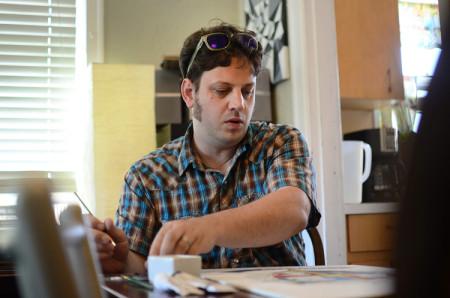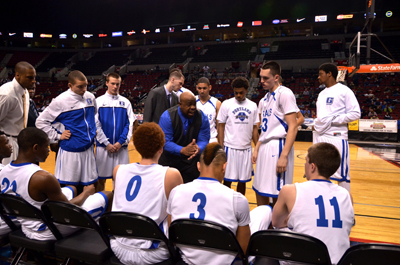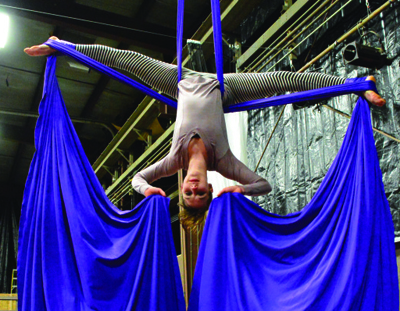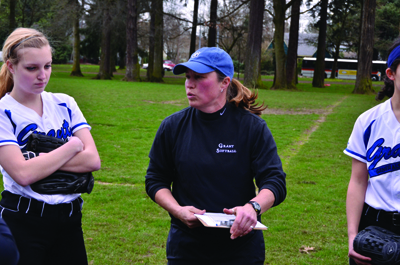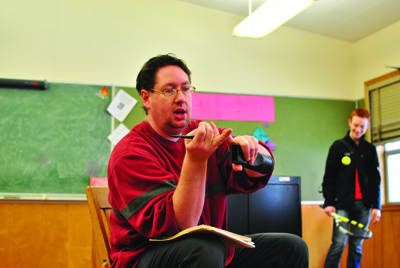It’s a typical Saturday night in Northeast Portland and Grant High School students are gathered at a house party. Some show up to converse with friends, while others are on the prowl for a hook up.
As the alcohol continues to flow, a boy grabs a girl’s hand and leads her upstairs. Another pair slips out to a secluded spot in the backyard. Meanwhile, the others remain inside socializing. When the group catches on, murmurs of curiosity ignite. Their first thought: Are they having sex?
Senior Adelyn Fujiwara often sees this happening at parties and says it’s easy to get caught up in a risky situation.
“Parties are definitely where people need to be more careful because you can get carried away,” she says. “You shouldn’t do anything that you wouldn’t be comfortable doing if you weren’t in that situation.”
Sitting in the bathroom with a friend nearby for support, a Grant senior waited for the results of her pregnancy test. Anxiety built as the seconds passed. Recently separated from her previous boyfriend, the test results couldn’t have come any slower. When they finally did, she was swept away by a wave of comfort. Negative.
“I felt really relieved that I didn’t have to deal with the thought of being pregnant anymore,” says the senior, who asked for anonymity because she’s uncomfortable with her peers knowing she had sex. “I just wanted to make him happy and I felt really bad afterward. I felt more pressured into it and not willing to do it.”
Senior TB says pregnancy will never be an issue for her in high school. Born in Vietnam, her culture and conservative parents have guided her belief that sex is sacred and should be saved for marriage.
“I think that teenagers shouldn’t be having sex,” TB says. “It should be something that you share with one person when you are committed to each other.”
Upon entering high school, teens are faced with many new things: new responsibilities, new surroundings and new pressures. One of the most daunting pressures among teens and their peers is sex. Whether it comes from within yourself or from friends, many students see having sex as a social norm at Grant.
Some students, like freshman Katlinn Berry, say they’re not ready to be sexually active. “I’m focused on school, not on boys. Boys aren’t going to choose my success in life,” she says.
Berry’s mom had a child at a young age and Berry says she’s “seen the outcome,” learned from it, and chose her own path. She says her friends are supportive of her decision and she feels no pressure to be sexually active.
While students like Berry say they don’t feel any pressures, many other Grant students do. Peer pressure from friends can have lasting impacts on teens if they decide to refrain from sexual activity. Whether it’s a friend’s constant pestering or someone in dismay because you said ‘no,’ teens need to remember that standing by their morals won’t be the end of the world.
“I’m fine with saying ‘no’ because I’ve heard of situations from my friends where they’ve regretted the way their first time happened, and I don’t want that to happen to me,” Fujiwara says. “I have been asked by people, ‘Don’t you want to get it over with before college?’ But I don’t really treat it as something that should be done by a certain time.”
However, teens’ hormones cause them to think about sex constantly. History teacher Dan Anderson believes girls and boys see sex from very different angles due to nuances in brain functions between genders. This is why he thinks that boys need time to catch up emotionally.
“Girls have sex because of what’s in their heart and the feelings they’re having,” Anderson says. “Boys are just having sex because they like to have sex.”
Anderson believes that it’s better to wait. “The later the better,” he says.
Although there are plenty of things that can go right, getting involved sexually at any age can result in a lot of things going wrong. Even with years of sexual education, often beginning as early as fifth grade, raging teenage hormones cause countless numbers of teens to forget about the consequences of sexual activity.
One Grant senior girl never imagined the consequences would affect her. Although she was on a method of birth control, her boyfriend at the time didn’t use condoms.
“He thought sex was more enjoyable without condoms and he would rather not use them for that reason,” she recalls. “I thought that the fact that I was on birth control would completely protect me from pregnancy. I use protection now because I got pregnant and I don’t want that to happen again.”
She had a miscarriage. With no boyfriend or baby, she says she could only blame herself. “I’m being more cautious now,” she says. “I no longer feel infallible, which is good even if invincibility is a comforting and fun feeling.”
Dr. Valerie Correa, a licensed clinical psychologist and family therapist in Vancouver, Wash., says the feeling of invincibility is common among teens. “At this age, both genders often feel invincible and do not think consequences will happen to them,” she says. “This makes choices around self-protection less of a priority and more risk for a pregnancy, sexually transmitted disease or a sexual assault.”
Senior Clyde Mercier found out the hard way about the consequences of sex when his method of protection failed. He remembers the terrifying feeling he felt when Donnalea Powell came to Benson High School during one of his night school classes. She told him she was pregnant with his kid.
“I was scared. I didn’t know what to do,” Mercier says. “I didn’t do any of my work. I didn’t do anything.”
At that point, he was full of doubts about sex. Was having sex even worth the risks? He wants teens to realize they “should still be careful even though they have protection. Having protection doesn’t always mean you’re safe.”
Despite his feelings prior to his daughter’s birth, Mercier accepted the challenge of being a dad and has learned to love it with the help and support of his family. “I’m fine now. I love my daughter to death,” says Mercier. “She’s my everything.”
Though senior Anna Aase hasn’t experienced a situation like Mercier’s, she learned all about the possible complications of getting sexually involved. “It can make things very complicated because not a lot of people trust the person they’re having sex with,” she says.
When Aase thinks about her own experiences, she realizes the pressures involved with having sex are very real. “In high school, I just feel like that’s all people think about,” Aase says. “It’s either they’re pressured by the boy to want to have sex, or from friends.”
Many teenagers, like Aase, have experienced a wide array of pressures. Junior Jacob Finkelman says the pressures to be sexually active come from within.
“I’ve never been pressured into having sex, nor have I ever pressured somebody into doing it,” says Finkelman. “I think that’s an over-exaggerated stereotype that people have about sex in high school, but I think there’s often personal or subconscious pressure.”
Freshman Claire Brown disagrees. She believes the pressures come solely from peers, and that in high school the majority of teenagers are already sexually active. “When you come to high school, everyone’s saying they’re [having sex] and then you feel like you should,” Brown says.
Brown’s beliefs may not be so far off. A 2011 survey by the Centers for Disease Control and Prevention reveals nationally 47.4 percent of high school students admit to having sex.
Aside from the pressures, Correa says all the hype about having sex in high school isn’t verifiable. Sex as a teenager most likely won’t be anyone’s best experience.
“There is a lot of social pressure to gain acceptance [because] sexual behavior often receives a response and attention,” says Correa. “Sometimes, teens are afraid to be seen as a virgin, that somehow that means someone does not desire them.”
However, the way Correa sees it, being “a virgin can mean you have self-respect, self-control, self-protection and can discern who is a healthy mate or not.”
For TB, that’s exactly what virginity is: self respect.
TB was 10 years old when her parents decided to move to Portland from Vietnam. Many aspects of her culture still remain with her. One of them is the common belief that sex should only be for married couples. As a bystander in the arena, TB notices many reasons why teens choose to have sex.
“I think peers play an important role,” says TB. “Hearing it from other people has a bigger impact, especially if you don’t have a strong principle or philosophy for yourself. Then it’s really easy to give in.”
Although TB isn’t able to turn to her parents for relationship advice, she has a strong set of ideals she holds close. “My parents and my culture are 50 percent of it. The other half is just me,” TB says. “I like to be upfront about it before I start dating. If he’s not willing, I don’t think it would work out.”
But sexual activity among teens is nothing new. Social studies teacher Anderson says kids hook up now more than when he was a kid. He recalls being in high school and seeing a common sexual refrain among his friends and other people he knew. Although he knows people still had sex when he was younger, he says it’s a lot more prevalent now.
Anderson, who graduated high school in 1983, remembers his peers saying things like, “I don’t want to have sex with someone unless I love them.”
“I never hear kids say that today,” he says. “Back in my day, people said, ‘I don’t want to just have sex with the first person who comes along.’”
Today, the hallways of Grant are filled with students gossiping and whispering about the latest news on who hooked up, who cheated and what happened at the weekend party. Aase feels that a lot of the pressure to be involved sexually comes from the media. “TV shows nowadays are all about sex and girls putting out their bodies,” Aase says.
Freshman Henry Enders says he doesn’t like the way women are portrayed. “Girls are kind of treated as objects a lot of times, in music, too,” Enders says.
But regardless of what Enders sees and hears, he feels many high school students look forward to becoming sexually active to gain a sense of maturity. “I think a lot of people try to rush into sex to say that they’ve done it,” he says. “You want to say you’ve done it before your friends.”
When thinking about college, senior Ruth Strauss is glad to have experienced sex in high school. Being thrown into a new atmosphere, Strauss doesn’t want to have to worry about having sex for the first time in college.
“A lot of my friends had experienced it, and sex is something that is bound to happen,” Strauss says. “I waited for a while, but then the situation presented itself and I felt like it wasn’t bad timing.”
However, she believes that for some people it’s better to wait to have sex. “It’s not something that should happen really young,” she says. “Sex is complicated and you have to be mature enough to understand that.”
Grant Magazine reporter Nina Greene contributed to this report.


































